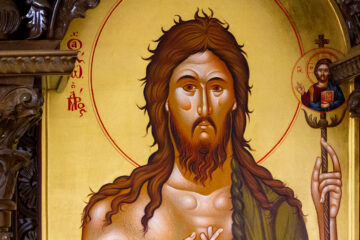Protopresbyter Georgios Dorbarakis
I was in the Evangelismos Hospital. I was concerned about my soul’s unreadiness. When my spiritual guide (the late Elder Epifanios Theodoropoulos) visited me, I said: ‘I’m praying that God will give me a few more years of life, so that I can repent’. He answered: ‘You don’t need years, repentance is like lightning (K. Yiannitsiotis, Κοντά στον Γέροντα Πορφύριο [Close to Elder Porfyrios].
The late author had a close relationship with Saint Porfyrios- which is why he wrote the book- and also with the great and wise late ‘Elder of Athens’, as Fr. Epifanios was called. To be precise, it was Fr. Epifanios who sent his spiritual child to the great saint, to get advice on various critical problems in his life. Fr Epifanios, as spiritual guide, wanted confirmation of what he’d told the man and said: ‘What I’ve told you about this particular matter holds good, unless Elder Porfyrios says otherwise. What he says will be the end of it and you can erase anything else that I’ve told you’. As a result, the writer became acquainted with Saint Porfyrios to such an extent that, from the notes he made at their meetings- which the saint knew about because of his gift of insight- he put together a bulky tome, an important repository of testimonies to the great saint, which was published some years ago by his monastery.
In the above excerpt from the book, the weight falls on the answer of wise Elder Epifanios. At Saint Porfyrios’ behest the writer was in hospital, because of health problems. Given the possibility of an unfortunate outcome, the writer’s experience was that of a person at death’s door. There was the likelihood of a stroke, which was dealt with painlessly, in the end, through the prayers of the saint. The problem exercising the man’s mind was the ‘unreadiness of his soul’. He realized that he hadn’t completed his repentance- and who can say that they’ve done so, when even the greatest saints prayed, to their last breath, for the Lord to give them time for repentance. So his prayer was for a few more years life in order to repent the better. Elder Epifanios’ answer seems unexpected: repentance doesn’t need many or even a few years; ‘it’s like lightning’.
It seems that the great Epifanios didn’t accept the prayer of his spiritual child- repentance really does need time to be experienced. Scripture itself reveals that the gift of time to us on the part of God is precisely so that we can repent. ‘I have given her time so she may repent’ (Rev. 2, 21). Similarly, Saint Peter emphasizes in his second catholic epistle that, through his forbearance towards us, the Lord is extending the time before his Second Coming so that, if possible, everyone will come to repentance. Our every day is an extension of the time for repentance before he comes again. Saint Paul says the same: ‘God’s kindness leads to repentance’
And the Lord himself began his public ministry with precisely this exhortation: ‘Repent for the kingdom of God is at hand’. So time and repentance are indissolubly linked, as the Elder clearly knew. This is what makes his observation to his spiritual son sound strange.
In the end, however, things really aren’t strange at all. Because both aspects are valid. Repentance is an event ‘like lightning’ in the sense that the Lord sees any crack in people’s heart, any sigh, that is, over the mess their lives are in and he sends a ray of his energy to enter through it. In this way, he illumines them and they weep over their filth, wash it away and turn eagerly to him. This is what happened in the case of the Prodigal Son: ‘when he came to his senses’… ‘when I arise, I’ll go to my Father’. But it’s also something that requires time in the sense that every moment when people repent is used to confirm their repentance, to deepen it and to extend it. In any case, our course in life, if we believe, is ‘from faith to faith’, which means ‘from repentance to pure repentance’. Repentance shows faith in Christ or, to put it another way, faith in Christ is shown by repentance, as a change in the way we live. This is precisely why we shouldn’t ‘throw away’ or ‘kill’ our time. That’s like getting rid of God’s gift for our salvation.
The saintly Elder Epifanios, then, while recognizing the proviso that time’s necessary for repentance, wants to turns the sick man’s attention to the moment, to now. This is what he should be making the most of, because this is God’s time. It’s as if he’s saying ‘Don’t wait for more time. Start to repent now’. The robber on the cross took advantage of one such moment, came to his senses and gained paradise. The Samaritan woman in the Gospel, Saint Foteini, seized the moment of her relationship with Christ, which gave her the opportunity to find the true source of life. Saint Paul considered the moment when Christ appeared to him and called upon him to change his life to be the most important and conclusive he ever experienced. Saint Mary the Egyptian saw God’s refusal to allow her entry into his church as the lightning that illumined her to repent and to reach unscalable heights of sanctity. There’s no end to the list. So, indeed, we don’t need years for repentance. The years are only for the manifestation of its light.
Source: pemptousia.com



0 Comments